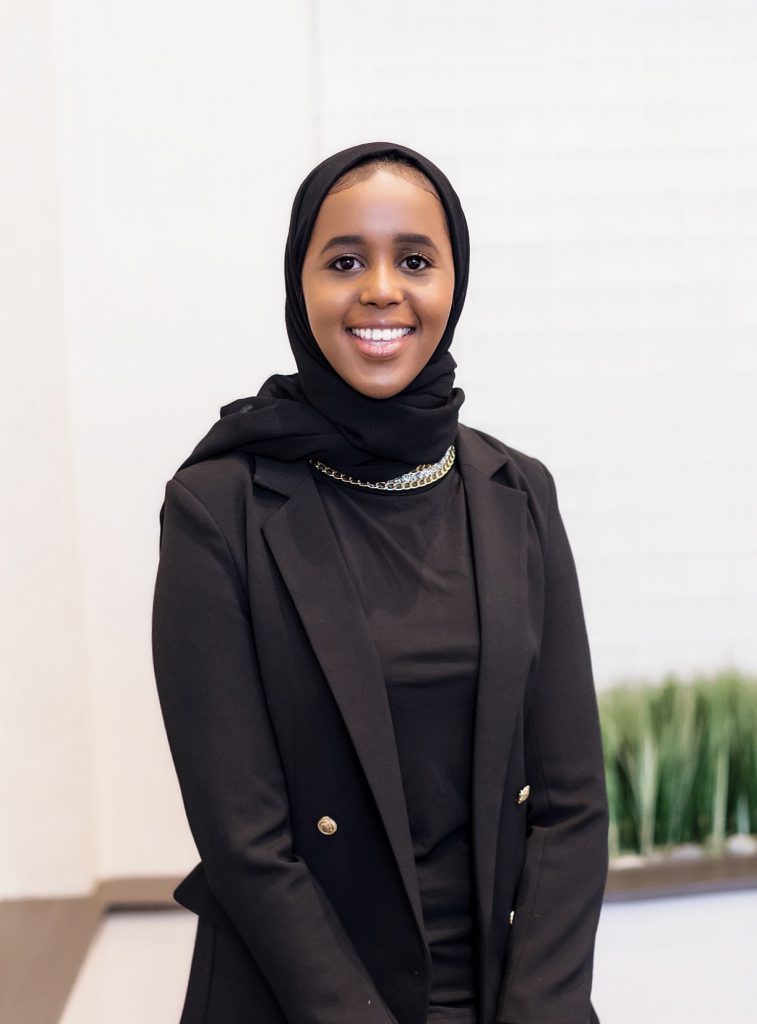
This is the story of an amazing young woman who used her love of sport, intelligence, and fierce determination to show young girls that anything is possible, and that dreams can come true.
In just a few short years, Muna Mohamed received her master’s in kinesiology, started her own business, and was recently recognized by three influential organizations on local and international levels. She was one of four student finalists in the MN Cup competition, which awards emerging entrepreneurs with support for building a business plan and expanding their networks. As one of only fifty accepted applicants from around the world, she was chosen to attend the Salzburg Global Forum for Young Cultural Innovators, an international conference that brings together rising talents in the creative sector to drive social, economic and urban change. And she was selected as a Women’s Foundation of Minnesota Innovator, receiving a $2,500 grant which she will use to create a photography exhibit to tell the stories of young women and girls in sport.
This is how her journey started.
Making connections

In 2013, Mohamed was an undergraduate at Augsburg College, studying exercise science and committing her spare time to the East African community in Minneapolis’ Cedar-Riverside neighborhood. “I wanted to work with young girls at the community center, where there were opportunities to play sports, particularly basketball,” she says. “I was an athlete myself, but I looked different. Where other girls were playing sports wearing traditional sports uniforms, I observed modest clothing practices of Muslims that did not align with the current sports uniforms provided by the schools. This posed a challenge.” At the community center, she met Dr. Chelsey Thul, lecturer in the School of Kinesiology, and her colleagues, who were working with mothers, grandmothers, and young girls in the community, teaching about nutrition and physical activity. Thul was conducting research at that time to understand physical activity levels through the voices of East African immigrant adolescent girls. Mohamed and Thul made an instant connection, and that was a turning point for Mohamed. She became a community partner in Thul’s research.
Thul, colleagues, and community partners received a grant to work with girls who attended the community center, teaching them to design culturally relevant fitness attire that would allow them to play sports with less restrictions.
“I was inspired by working with young girls and adolescents,” says Mohamed. “I could put my artistic skills to work designing and creating fitness wear—I’d make a sketch and then figure out how to create it. And, I saw this work give East African girls an opportunity to be physically active.” This project was a collaboration between the School of Kinesiology, the Tucker Center for Research on Girls & Women in Sport, the College of Design, community members and the youth advisory council at the Cedar-Riverside community center.
Influenced by this, Mohamed began her own research. From her continued work in this area, she started her business, Modest & Active, whose mission is to provide a collection of active apparel for women and girls that adheres to their values. “The company is built on a foundation of developing collaboration with major stakeholders, including youth, community members, and local schools and universities,” says Mohamed.
Mohamed and Jennifer Weber, Minneapolis Indian Education Special Education teacher and co-founder of the Cedar-Riverside Community Traveling Basketball Program, worked with the first girls basketball team that had the option to use either traditional or modest wear for playing sports. “Everyone got to look the same as their teammates and focus on their athletic skills,” says Mohamed. “We actually eliminated the clothing barrier.”
Advancing her education

In connecting with Thul and her colleagues, Mohamed realized she was ready to move forward with her education. “I wanted to work with Dr. Thul in the master’s program in the School of Kinesiology because of her love of research and the chance to get women’s voices heard,” she says. “I saw how impactful her work was with East African mothers and their daughters. Research can help create change.” She got her master’s, she says, because of her love of sports and commitment to eliminate barriers that can sometimes prevent young girls from engaging in sport. “My ultimate goal is not just to create sport uniforms, but active wear as a whole for all Muslim women so that regardless of their physical activity or sport, they can be comfortable and confidant when they participate.”
Mohamed is also tuned to the power of people’s stories. She envisions creating a company that can use stories to inspire young people to become involved in physical activity and sports. “We can produce clothing, but there is space here too for producing culturally sensitive programming that will support girls and young women.” She cites Soul Cycle as a model. “My goal is to have my business, and to provide opportunities for community physical activity programming, arts, sports, and telling stories.”

Mohamed credits her mentors and experiences in the Cedar-Riverside community with a large measure of her success. She says that Dr. Thul and Weber gave her opportunities to realize the impact she could make. “I went from playing basketball and being a coach to working with them to provide opportunities for young Muslim girls, and boys too. We were able to expose kids to opportunities that other kids had, and mentor them, and watch them mentor the next generation. It’s beautiful when a young Muslim girl says, ‘I want to be a coach, too.’”
What advice would Mohamed offer to young, aspiring entrepreneurs?
“Network,” she says. “Do research. Information is power. When opportunities don’t come to you, you have to find them.”
She adds, “Pitch your ideas, and watch others pitch theirs. Instead of watching 40 minutes of Netflix, watch 40 minutes of pitches. And don’t be afraid. Follow your dreams and instincts, and things will fall into place. Life has its way of making things right.”



